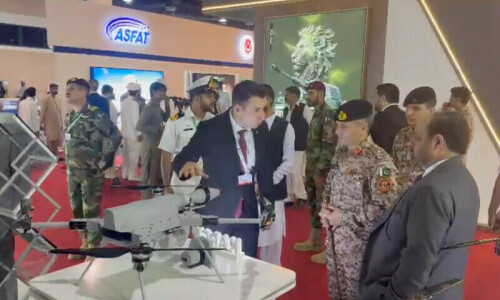
KARACHI: A five-judge special bench of the Supreme Court observed on Tuesday that there should be no compromise on people’s fundamental rights in the search for security and asked the Sindh government to track down elements involved in target killings in Karachi.
Chief Justice Iftikhar Mohammad Chaudhry, who heads the bench hearing the suo motu case on the city’s security situation, said the court wanted to know who the perpetrators were. “Why is the provincial government not waking up itself? The fundamental right to security is being violated.” The chief justice said the compensation to be paid by the government to the families of people killed in the violence was the public money.
One member of the bench said it was not a difficult task to trace the killers because everybody knew them, but blind FIRs against unnamed suspects were registered to be used later. He said the culprits were shown on TV while shooting and yet they could not be identified.
Another judge was critical of the deployment of Rangers in the city for controlling the security situation. “Why don’t you build your own force instead of borrowing it from the federal government,” he asked the provincial police chief.
The judge referred to the May 12, 2007, incident and asked who had ordered Rangers not to do anything.
The chief justice asked Sindh IG Wajid Ali Durrani about investigation into the murder of Advocate Muhammad Murtaza Chinoy and ordered him to depute a DSP as investigation officer.
The court asked the IG to submit progress reports about investigation into all incidents of target killings, extortion and abduction. The police chief is also required to record statements of 18 people who had been freed from the custody of target killers over the past month.
The court asked Attorney General Moulvi Anwarul Haq to submit investigation reports of intelligence agencies on target killings in Karachi at the next hearing on Sept 5.
Earlier, Hafeez Pirzada, the counsel for the Sindh government, concluded his arguments. He commenced his submissions by explaining the demographic imbalance and after building up his arguments said that measures should be taken for a “witness protection programme”.
He said the ethnic divide was strong in the city because of increase in population which resulted in division of many localities on the basis of language.
Mr Pirzada laid stress on fundamental rights and placed, specifically on Articles 8 (laws inconsistent with or in derogation of fundamental right to be void), 9 (security of a person), 14 (inviolability of dignity of man), 23 (provisions as to property), 24 (protection as to property rights) and 25 (equality of citizens).
Meanwhile, the court allowed civil miscellaneous applications (No 4108, 531-K, 532-K and 533-K of 2011) filed by the Awami National Party president, Sindh Bachao Committee, Sindh United Party, Karachi Bar Association, Sindh Bar Council, former JI MNA Muhammad Laiq and three others. They have requested the court to allow them to be party in proceedings.
APP adds: The bench comprising the chief justice, Justice Anwar Zaheer Jamali, Justice Sarmad Jalal Usmani, Justice Amer Hani Muslim and Justice Ghulam Rabbani expressed ‘dissatisfaction’ over the investigation reports submitted by the Sindh government on violence in the city.
Hafeez Pirzada informed the court that gangsters were involved in land grabbing and extortion, causing lawlessness in certain parts of the city.
He said ethnic and criminals groups were also involved in subverting peace in the city, adding that the provincial government had taken appropriate measures to improve the situation.
The chief justice asked Mr Pirzada to assist the court in this regard.
The Sindh IG apprised the court of actions taken so far by police against criminal elements.












































Dear visitor, the comments section is undergoing an overhaul and will return soon.